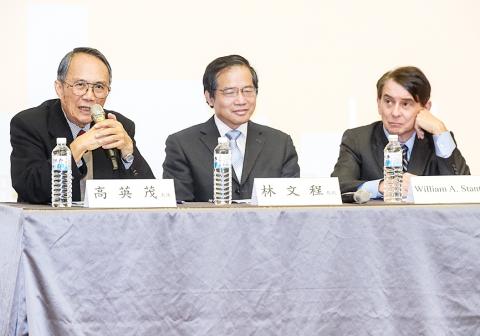US President Donald Trump’s unpredictability makes him “kind of afraid” of what might happen if Trump’s reported meeting with Chinese President Xi Jinping (習近平) next month in the US occurs, former American Institute in Taiwan (AIT) director William Stanton said yesterday.
Stanton, who led the AIT’s Taipei office from 2009 to 2012 during then-US president Barack Obama’s presidency, spoke to reporters in Mandarin on the sidelines of a forum in Taipei about Taiwan’s strategic planning during Trump’s term in office.
The forum was hosted by the Taiwan Forever Association and the International Committee for a Democratic Taiwan, and Stanton was one of the panelists.

Photo: Huang Yao-cheng, Taipei Times
While it is hard to predict what Trump and Xi would talk about when they meet, many political analysts have noticed the new US president’s inclination to pay little attention to policy issues during his meetings with foreign heads of state, Stanton said.
“From what I heard, during Trump’s meeting [last month] with Japanese Prime Minister Shinzo Abe, the US side did not even have someone there to take minutes and it had to use those kept by the Japanese afterwards,” Stanton said.
“That is why I am kind of afraid about his meeting with the Chinese leader, because I do not know if he is ready,” Stanton added.
Asked whether the Trump-Xi meeting would bode ill for Taiwan, Stanton said he was unsure, but added that he believed the biggest problem would be Trump’s tendency to flip-flop on issues and make conflicting statements.
He added that as Trump is more business-centric, Taiwan might not appear as valuable to him as in the eyes of Obama, who valued Taipei’s democratic achievements.
Turning to cross-strait issues, Stanton said he is of the opinion that President Tsai Ing-wen (蔡英文) has made a serious effort to maintain the “status quo” and ensure peace across the Taiwan Strait.
“However, it seems that the Chinese government is still not satisfied and insists on the so-called ‘1992 consensus,’” Stanton said, urging Beijing to respect the opinions of the Taiwanese, the majority of whom disagree with China’s viewpoints.
The “1992 consensus” refers to a tacit understanding between the Chinese Nationalist Party (KMT) and the Chinese Communist Party that both sides acknowledge there is “one China,” with each side having its own interpretation of what “China” means.
In 2006, former Mainland Affairs Council chairman Su Chi (蘇起) admitted making up the term in 2000, before the KMT handed power to the Democratic Progressive Party.
Tsai’s refusal to acknowledge the “1992 consensus” has resulted in several punitive measures by Beijing.

The Coast Guard Administration (CGA) and Chunghwa Telecom yesterday confirmed that an international undersea cable near Keelung Harbor had been cut by a Chinese ship, the Shunxin-39, a freighter registered in Cameroon. Chunghwa Telecom said the cable had its own backup equipment, and the incident would not affect telecommunications within Taiwan. The CGA said it dispatched a ship under its first fleet after receiving word of the incident and located the Shunxin-39 7 nautical miles (13km) north of Yehliu (野柳) at about 4:40pm on Friday. The CGA demanded that the Shunxin-39 return to seas closer to Keelung Harbor for investigation over the

An apartment building in New Taipei City’s Sanchong District (三重) collapsed last night after a nearby construction project earlier in the day allegedly caused it to tilt. Shortly after work began at 9am on an ongoing excavation of a construction site on Liuzhang Street (六張街), two neighboring apartment buildings tilted and cracked, leading to exterior tiles peeling off, city officials said. The fire department then dispatched personnel to help evacuate 22 residents from nine households. After the incident, the city government first filled the building at No. 190, which appeared to be more badly affected, with water to stabilize the

DEEPER REVIEW: After receiving 19 hospital reports of suspected food poisoning, the Taipei Department of Health applied for an epidemiological investigation A buffet restaurant in Taipei’s Xinyi District (信義) is to be fined NT$3 million (US$91,233) after it remained opened despite an order to suspend operations following reports that 32 people had been treated for suspected food poisoning, the Taipei Department of Health said yesterday. The health department said it on Tuesday received reports from hospitals of people who had suspected food poisoning symptoms, including nausea, vomiting, stomach pain and diarrhea, after they ate at an INPARADISE (饗饗) branch in Breeze Xinyi on Sunday and Monday. As more than six people who ate at the restaurant sought medical treatment, the department ordered the

Taiwan plans to cull as many as 120,000 invasive green iguanas this year to curb the species’ impact on local farmers, the Ministry of Agriculture said. Chiu Kuo-hao (邱國皓), a section chief in the ministry’s Forestry and Nature Conservation Agency, on Sunday said that green iguanas have been recorded across southern Taiwan and as far north as Taichung. Although there is no reliable data on the species’ total population in the country, it has been estimated to be about 200,000, he said. Chiu said about 70,000 iguanas were culled last year, including about 45,000 in Pingtung County, 12,000 in Tainan, 9,900 in